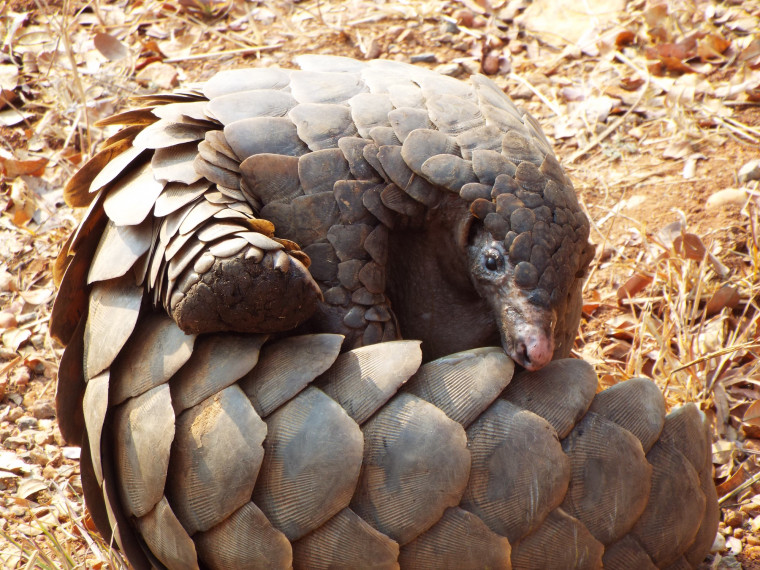U.S. Finds China’s Pangolin Trade Undermines Wildlife Treaty
Professors Erica Lyman and Nick Fromhertz are part of an effort to protect Pangolins – the most heavily trafficked mammals in the world. The U.S. Interior Dept took action as a result of their successful Pelly Petition.
Open gallery

The U.S. Department of the Interior has announced that China’s failure to halt its trade in endangered pangolins diminishes the effectiveness of an international wildlife treaty. Following the certification, which was published on September 8, 2023, President Biden must decide by late October whether to impose a trade embargo against China to prompt its compliance.
Pangolins are the most heavily trafficked mammals in the world. The scaly mammals are consumed in China as a luxury meat, and pangolin scales are used in traditional Chinese medicine. The Convention on International Trade in Endangered Species bans the international pangolin trade, yet trade continues in China because of legal exemptions and poor enforcement. “We’re delighted the U.S. government is finally pressing China to crack down on its devasting pangolin trade,” said Sarah Uhlemann, international program director at the Center for Biological Diversity. “Pangolins face imminent extinction, yet the Chinese government continues to promote pangolin scales in the traditional Chinese medicine trade. If we want these oddly adorable creatures to survive, China must act now, and U.S. sanctions could be the wake-up call China needs.”
The Interior Department’s decision responds to a 2020 petition by conservation organizations, including Lewis & Clark Law School’s Global Law Alliance for Animals and the Environment (Global Law Alliance), requesting China’s certification for CITES violations under a U.S. law called the Pelly Amendment. Upon certification, the Pelly Amendment requires the president to decide within 60 days whether to embargo “any product” from that nation to prompt compliance. If the president fails to impose sanctions against a certified nation, then an explanation to Congress is necessary.
“This certification opens a window in which China has an opportunity to respond to global concern about ongoing illegal trade in pangolins to China by closing its domestic markets which continue to fuel rampant exploitation,” said Erica Lyman, Clinical Professor of Law and Director of the Global Law Alliance. “The failure to shut down the trade, sale and consumption of pangolin scales in China should result in the strongest possible condemnation from the U.S. and the rest of the international community.”
According to Nick Fromherz, Adjunct Professor with the Global Law Alliance, “while China has taken token steps to address the pangolin crisis since the COVID-19 outbreak, these steps are insufficient. Both the United States and China need to show leadership on the issue and do more to protect pangolins and end the illegal trade.”
Despite CITES’ ban on international pangolin trade, approximately 600,000 pangolins were illegally traded between 2016 and 2019 alone. Pangolin scales are legally sold in China for use in traditional Chinese medicine, where the scales are marketed to increase blood circulation and lactation. Research by the Environmental Investigation Agency into the online availability of traditional Chinese medicine products containing pangolin scales in 2022 identified a minimum of 52 products manufactured by Chinese companies.
“EIA has monitored the illegal trade in pangolins for many years and launched a campaign to highlight their plight in 2018,” said James Toone, EIA UK deputy campaign lead (Pangolins). “Demand for pangolin parts and derivatives for use in the traditional Chinese medicine industry is a significant threat to the species. Without action taken to stop the use of pangolins and their derivatives by companies manufacturing medicinal products, pangolins face potential extinction. Reforms in 2022 by the People’s Republic of China to laws designed to regulate the use of pangolins and other endangered species do not go far enough — research from 2023, soon to be published by EIA UK, shows that more than 50 products manufactured by companies and readily available online still contain pangolin derivatives. More needs to be done by the government of China to implement fully the most recent CITES resolution and close its domestic markets that fuel illegal trade in pangolins.”
In 1993 President Clinton used the Pelly process to certify and ban wildlife imports from Taiwan for its rhino trade, which violated CITES. Taiwan promptly closed its domestic rhino market.
View the full press release here.
The Global Law Alliance is a clinic at the law school and champions wild animals and wild spaces around the world.
Law Communications is located in room 304 of Legal Research Center (LRC) on the law Campus.
MSC: 51
email jasbury@lclark.edu
voice 503-768-6605
Cell: 626-676-7923
Assistant Dean,
Communications and External Relations, Law School
Judy Asbury
Law Communications
Lewis & Clark Law School
10101 S. Terwilliger Boulevard MSC 51
Portland OR 97219

